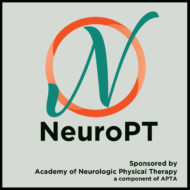In this second installment of our series on rare neurologic diseases, host Katy McGraw talks with Heather Cianci about Progressive Supranuclear Palsy (PSP), a neurologic disease that can mimic some features of Parkinson Disease (PD) like loss of balance and a tendency to fall backwards, but that also has unique features such as the loss of vertical gaze, and behavioral changes. Heather discusses clinical signs to look for to treat and/or refer out for. She also talks extensively about treating PSP clinically throughout the disease course, palliative care for patients with advanced PSP, working within interdisciplinary teams to support patients with PSP, and so much more.
Enjoying our new series on rare neurologic diseases? We want to hear from you! Give us feedback, share ideas for future podcasts, and connect us to expert clinicians treating patients with those diseases. Email us at: neuroddsig@gmail.com
The Degenerative Diseases Special Interest Group is part of the Academy of
Neurologic Physical Therapy – www.neuroPT.org
Show notes available: https://app.box.com/s/59dhwr9i0p29p4hrkxjnvbdyxl8kh94m
Podcast: Play in new window | Download (Duration: 49:58 — 40.0MB)
Subscribe: Apple Podcasts | Google Podcasts |
